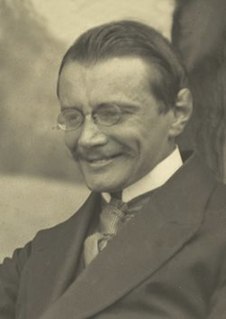A Quote by Jean Leloup
Once again, we are reminded that awakening, or enlightenment is not the property of Buddhism, any more than Truth is the property of Christianity. Neither the Buddha nor the Christ belongs exclusively to the communities that were founded in their names. They belong to all people of goodwill, all who are attentive to the secret which lives in the depths of their breath and their consciousness.
Related Quotes
And the desire to own property, to take for ourselves things which in no way belong to us, does not stop short at the sun. The air is already bought and sold as a commodity, by health resorts. And what of water? Or waterpower? Why should the earth be parceled out into private hands? Is it any different from the sun? No; the earth belongs to the people who live on it. God intended it for them, but it has been taken over by private individuals. Privare means to steal. Thus private property is stolen property - property stolen from God and from humankind!
Christ remains the most influential figure in history. Any list of world-transforming individuals would no doubt include Moses, Buddha, and Muhammad. Moses, Buddha, and Muhammad, however occupy totally different places in Judaism, Buddhism, and Islam than Christ occupies in Christianity. Moses, Buddha, and Muhammad never professed to perform miracles; indeed they never claimed to be anything more than men. They viewed themselves simply as God's messengers. Christ is the only person in history who has defined a whole religion around his person.
The whole earth, then, belongs to Jesus. It belongs to him by right of creation, by right of redemption and by right of future inheritance - as Paul affirms in the magnificent cosmic declaration of Colossians 1:15-20. So wherever we go in his name, we are walking on his property. There is not an inch of the planet that does not belong to Christ. Mission then is an authorized activity carried out by tenants on the instructions of the owner of the property.
The question has often been asked; Is Buddhism a religion or a philosophy? It does not matter what you call it. Buddhism remains what it is whatever label you may put on it. The label is immaterial. Even the label 'Buddhism' which we give to the teachings of the Buddha is of little importance. The name one gives is inessential.... In the same way Truth needs no label: it is neither Buddhist, Christian, Hindu nor Moslem. It is not the monopoly of anybody. Sectarian labels are a hindrance to the independent understanding of Truth, and they produce harmful prejudices in men's minds.
There is something that governments care for more than human life, and that is the security of property, and so it is through property that we shall strike the enemy.... Those of you who can break windows--break them. Those of you who can still further attack the secret idol of property, so as to make the Government realize that property is as greatly endangered by women's suffrage as it was by the Chartists of old--do so. And my last word is to the Government: I incite this meeting to rebellion!
Property must be secured or liberty cannot exist. But if unlimited or unbalanced power of disposing property, be put into the hands of those who have no property, France will find, as we have found, the lamb committed to the custody of the world. In such a case, all the pathetic exhortations and addresses of the national assembly to the people, to respect property, will be regarded no more than the warbles of the songsters of the forest.
It is a moot question whether the origin of any kind of property is derived from nature at all. It is agreed by those who have seriously considered the subject that no individual has, of natural right, a separate property in an acre of land, for instance. By a universal law, indeed, whatever, whether fixed or movable, belongs to all men equally and in common is the property for the moment of him who occupies it; but when he relinquishes the occupation, the property goes with it. Stable ownership is the gift of social law, and is given late in the progress of society.
In civilized communities, property as well as personal rights is an essential object of the laws, which encourage industry by securing the enjoyment of its fruits; that industry from which property results, and that enjoyment which consists not merely in its immediate use, but in its posthumous destination to objects of choice, and of kindred affection. In a just and free government, therefore, the rights both of property and of persons ought to be effectually guarded.
Eyes are bold as lions,--roving, running, leaping, here and there, far and near. They speak all languages. They wait for no introduction; they are no Englishmen; ask no leave of age or rank; they respect neither property nor riches, neither learning nor power, nor virtue, nor sex, but intrude, and come again, and go through and through you in a moment of time. What inundation of life and thought is discharged from one soul into another through them!
Thirdly, the supreme power cannot take from any man any part of his property without his own consent: for the preservation of property being the end of government, and that for which men enter into society, it necessarily supposes and requires, that the people should have property, without which they must be supposed to lose that, by entering into society, which was the end for which they entered into it; too gross an absurdity for any man to own.
































